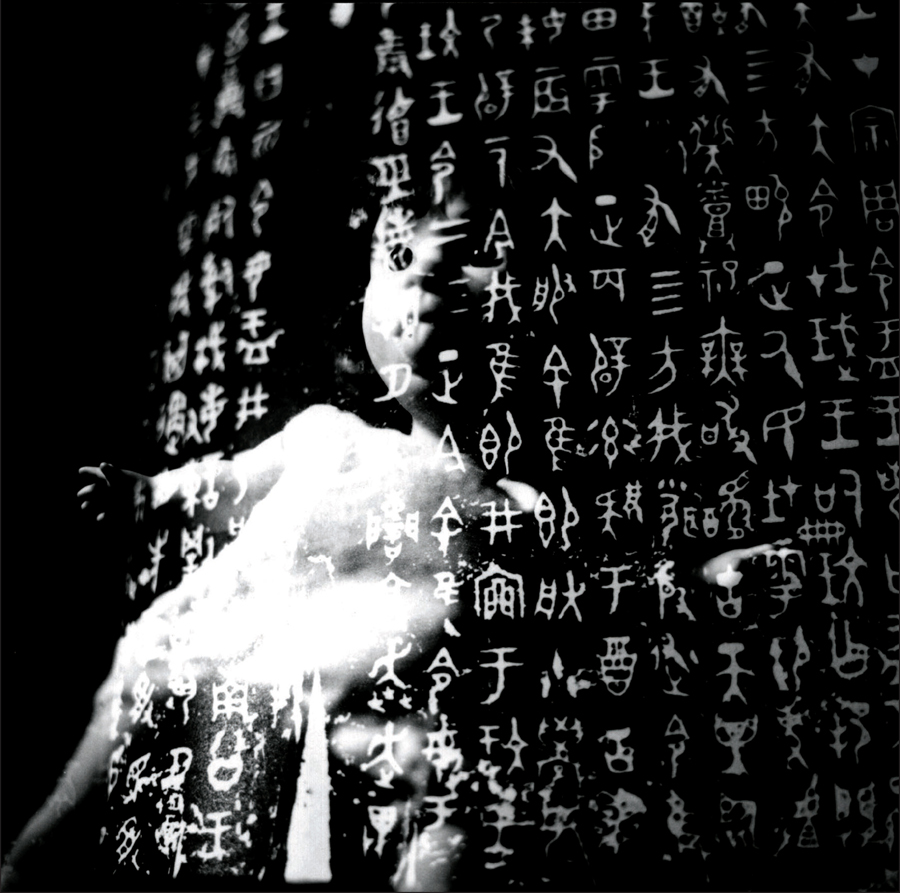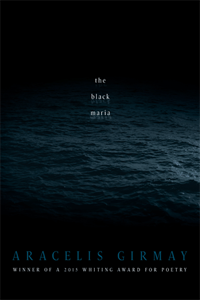
the black maria
Aracelis Girmay
BOA Editions LTD, $16 (paper)
the black maria, Aracelis Girmay’s third book of poetry, seeks to synthesize accounts of the Eritrean diaspora in order to understand place and experience in the 21st century. Girmay fastens herself to the idea of water—its power to both unify and alienate—as a vehicle for exploring loss, ancestry, and identity. The title, taken from a term for lunar “maria”—the moon’s dark plains once thought to be seas—provides the imagistic thrust of the poems, suggesting the absorbing confusion pushing the poet toward reconciliation. The collection explores the inevitable consequences of time, the poems building toward the realization of collective loss. Girmay starts with an assertion of independence and singularity, but ends with a statement of reunion: “I, Aracelis Kay Weyni Girmay, the narrator-author, born in the United States. My routes: Eritrea, Puerto Rico, African America” eventually leads to “let us name every air between strangers ‘Reunion.’” Girmay is a poet of both physical and metaphysical loss, weaving together intimate and communal stories to express the emotional agony of an exploited and paling culture. the black maria has an agenda, but not the one we might expect; rather than issuing a call to action for the Eritrean diaspora, the poet employs personal and ancestral experience to catalyze a unified, remembered loss. Her poetry is therefore a call for the recognition of vulnerability and subjectivity: in the poet’s own words, “& so to tenderness I add my action.” At times, the collection reads like a historical text; occasionally, it feels like angst immortalized in a diary; most often, the black maria reads like a poeticized eulogy—at once a celebration of life, an effort at reconciliation with death, and a testament to the unifying power of loss.
—Cassandra Balzer
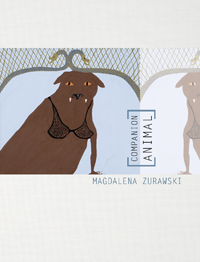
Companion Animal
Magdalena Zurawski
Litmus Press, $15 (paper)
Companion Animal, Magdalena Zurawski's first poetry collection, is in many ways a companion to her novel, The Bruise. Both have an exacting and deliberate plainness, and Companion Animal begins with an essay about The Bruise, which engendered in its author the desire to read the details of life as one reads details in books—a dangerous practice, for "the world is not a sealed system the way a book is." The poems that follow are the sober aftermath of (mis)reading meaning into life. Zurawski is a writer with nothing to say and everything to feel; because the poems are not charged with having to be about anything ("We dreamed of / leaving our heads / without a single / noun in them"), their bareness becomes their subject. Their lines, skinny and brusque, feel precarious: "What is mine / is not yours unless / you take it. // What I mean is / every dollar / hides a weeping / pair of genitals." The eponymous companion in the book is the absent beloved as well as two beloved dead poets, and it is also a dog—a dog that never becomes a symbol but instead stays, on each stark page, a real dog. Along the way, money is also in attendance, less as a subject than as a question: "What are these poems worth?" A lot, this book suggests, but that is the wrong question. A better one: "What is of value in a poem besides its meaning?" Zurawski, writing in solitude, seems to offer this answer: the transaction between the reader and the poet. The book's dedication reads "for you."
—Darcie Dennigan
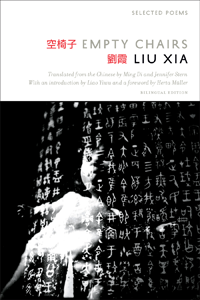
Empty Chairs: Selected Poems
Liu Xia (translated from Chinese by Ming Di and Jennifer Stern)
Grawolf Press, $16 (paper)
The poetry of Liu Xia, wife of imprisoned Nobel Peace Prize recipient Liu Xiaobo, employs delicate, practical phrases that nonetheless deliver a gut-wrenching punch: “There was a piece of paper with written lines, / but you couldn’t write a word. / I wanted to try on my new clothes / but I couldn’t undress.” The condition of oppression under which she lives belies the simplicity of her poetry: “This whole winter / I’ve been doing one thing repeatedly— / peeling grapefruits one after another / absorbing the nutrients of my own death.” Rendered in Ming Di and Jennifer Stern’s deft translations, her phrases reveal the ordinary and corporeal effects of harrowing political circumstances: “Your heart splits in pain, you clench your teeth in loss.” Empty Chairs samples from thirty years of work, beginning with a conversational voice that affords an intimate understanding of a static and confined life: “Then, we started to hate winter, / the long slumber. / We put a red lamp / outside overnight / so its light would tell our bird / we were waiting.” Inviting questions of freedom and stagnancy, the poems suggest that Liu’s speaker is no longer the beautiful free bird of this opening image, but “an old, foolish tree,” rooted and chained down by enforced silence. The reader leaves the page with a desire for Liu to become the bird she once was, empathizing with her anger: “I’m exhausted and want / to stop, but this spirit in me / won’t permit it.”
—Evalynn So
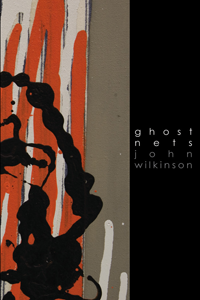
Ghost Nets
John Wilkinson
Omnidawn, $17.95 (paper)
Literary scholars are giving fresh attention to the concept of description (see a 2016 special issue of Representations), helping readers, unexpectedly, to think about certain kinds of poetry which have historically been described as difficult. One does not commonly associate straightforward description of physical environment with difficult poetry, but the highly pressurized verse of John Wilkinson, a British poet integral to the Cambridge School, lingers at the extremities of description—and it does so most potently when his writing trembles on the brink of legibility in its description of ordinary things: “dodgy track adhesion, / oil-spillage, clogged // leaf-filter”; or “hyper- / highlight cubed and floating, / dreaming its sur- / passing forest, flirted, / feinted.” Wilkinson’s poetry is characterized by its density—a term in the aesthetic philosophy of Nelson Goodman and others that refers to the degree of referential nuance in a verbal or pictorial artifact. Photographs, for example, are potentially denser in their signifying capacity than verbal images (a picture is worth…), but Wilkinson’s poems crowd the lyric frame, zooming from microscopic detail to split-screen to bird’s eye—a tendency it shares with the poetry of Andrew Zawacki. These referential flight-patterns cannot be torn from the thrilling sonic textures of Wilkinson’s poetry. All of these qualities are triggered by a vast vocabulary, a determinant of the spell cast by John Ashbery’s poetry as well, veering in perfect equipoise from recondite jargons to street slang to lyric finery: “Post-theory / creamy paper ashed, wrinkled / delta palm-fronds, looped lianas / stripped by fiery air.” After experiencing the charivari and virtuosity of Wilkinson’s poems—a terrific place for an American reader to start reading new British poetry—the susceptible reader may develop a stubborn preference for the kinky notes and fastidious rhapsody of full-blown lyric.
—Daniel Tiffany
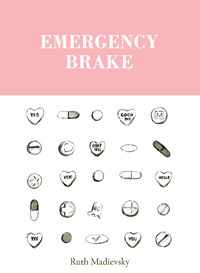
Emergency Brake
Ruth Madievsky
Tavern Books, $17 (paper)
Ruth Madievsky’s use of form dramatizes the imagery of hallucination, melding reality and illusion in unexpected ways. Her methods are surreal only in the sense that she orchestrates dramatic and sometimes violently sensual relations between the real and the so-called surreal—as if these two modes are acquaintances intent on intoxicating one another. “When January lifted its head / to a slow applause,” the book begins, “the hinges of everything alive / opened like fruit.” Madievsky’s images may be felt before they’re understood—“I felt you and I could fit / in the mouth of a spoon”—and the poems pop with hyperbole and tactile metaphor—“like we were coconut extract / or a bump of cocaine, / pollen and benzodiazepines.” Verve carries the volume: “the sound of wind” is “making love to a clothesline”; “I let my body / become a bedtime story”; and most unsettling, “yes, I swallowed a beehive.” At the same time, Madievsky’s precision—an approach that enumerates “the number of letters / in my name”—resists the blur generated by these “rabid,” grieving, sometimes funny “cocktails.” Madievsky’s imaginative powers seem locked in a duel with her cynicism. And maybe with empiricism in general: it is worth noting that the poet has done graduate work in pharmacology. Her “guess” is that we can always be reduced to the chemistry that composes us. But only almost. The name, the ritual, the poem remain behind to signify: “Eugene died. / We gave him to the fire.”
—Jesse Nathan
